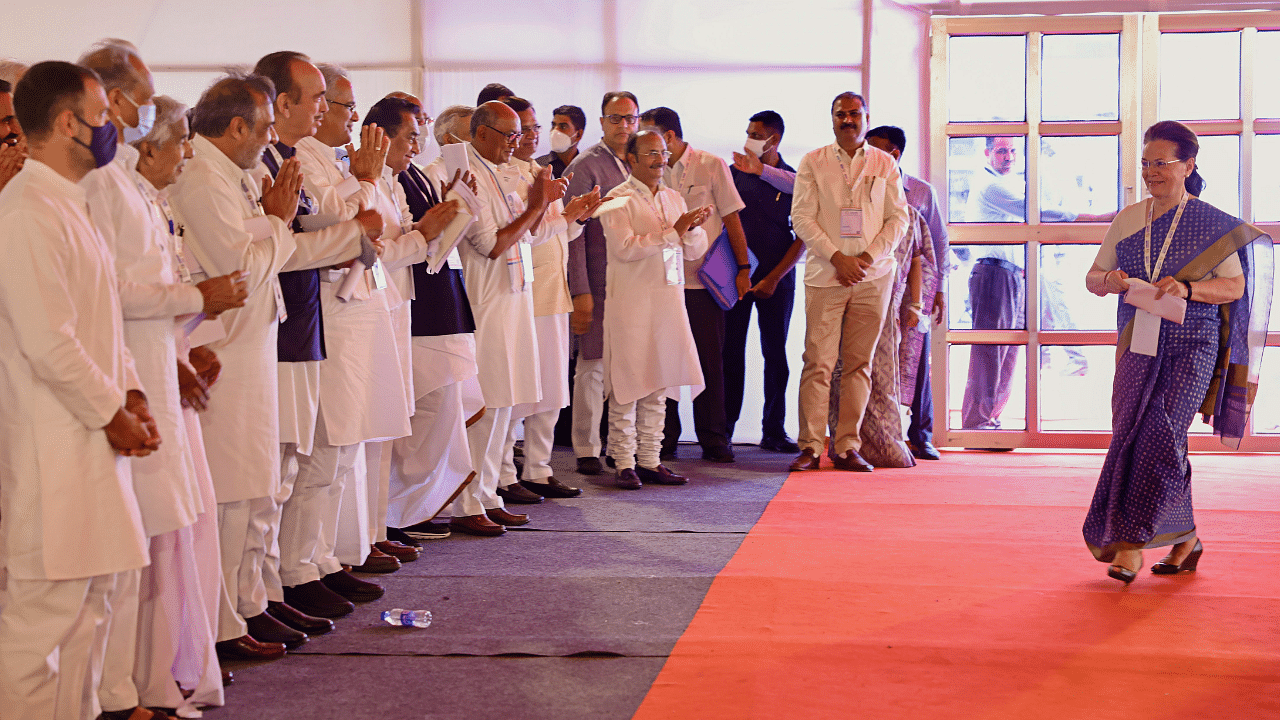
Facing the twin challenge of arresting Congress's decline in most states and the need to recapture power at the Centre, Udaipur Nav Sankalp Declaration on Sunday sought to do a tightrope walk between the issue of coalition and communalism.
"It is committed to establishing dialogue and contact with all like-minded parties to protect the spirit of nationalism and democracy and will keep open avenues for forging alliances as per the political circumstances," the party's declaration read, indicating its acknowledgment of the need for compulsive co-existence with regional parties, which had been its fate after losing power in 1999 and after its worst show of winning just 44 Lok Sabha seats in 2014 after a 10-year-long stint in power.
From Shimla to Panchmarhi, from Jaipur to Udaipur, subtle changes have occurred in the party strategy on the issue of alliance and ideology, particularly to its secular pitch.
In the 1998 Pachmarhi Congress grudgingly acknowledged the need for a coalition but many in the party never accepted the idea completely and felt that it is a temporary phenomenon.
Also read: We will overcome, says Sonia, announces political advisory group and task force on party reforms
In the 2002 conclave at Mount Abu, Sonia Gandhi gave further impetus to the idea of a coalition saying her party was not averse to alliances but it was only by 2003 when Congress categorically pitched for a coalition arrangement that ended up giving two shots of power to it in 2004 and 2009.
In the 2009 Lok Sabha polls, Congress did manage to increase its numbers from 145 in 2004 Lok Sabha polls to 206 but still had stitched a coalition UPA II to stay in power. But the party's doubts about coalition arrangements continued.
At the Talkatora AICC session in 2007, Sonia Gandhi said, "Participating in a coalition alliance does not mean that we lose our political vitality or existence."
Strengthening the line further, a meeting of the Congress Working Committee months before the 2009 Lok Sabha polls disfavoured any national alliance and instead batted for state-specific political understandings with regional parties. In 2011 UPA's Prime Minister Manmohan Singh's remarks that "some compromises have to be made for a coalition" had hogged headlines.
The Udaipur Declaration was also somewhat muted on communalism in stark contrast to what it had been maintaining before 2014. The declaration attacked the BJP for "targeting minorities, Dalits and OBCs" and "hatching an obnoxious conspiracy to divide" in the name of caste, religion, regionalism" and other aspects.
Also Read | Congress announces major organisational reforms: 'One person, one post' and 'one family, one ticket'
Congress at its 2010 AICC Burari session had said, "India is defined by its deep and abiding commitment to secularism. In India that loses its secular moorings no longer remains the India that our forefathers and great leaders fought for.". Congressmen were told that it is their "sacred duty to honour, protect and promote the secular ideal and always fearlessly practice it". The political declaration at Burari insisted "the lifeline of Indian democracy is secularism" and hit out at RSS and VHP saying they are "insidious in their effort to break India'' as it called the partymen to "call their bluff".
Even in the 2013 Jaipur declaration Congress called on "all secular and progressive forces of the country to unite in this ideological battle against those, who polarise and divide our society."
Deccan Herald is on WhatsApp Channels| Join now for Breaking News & Editor's Picks
